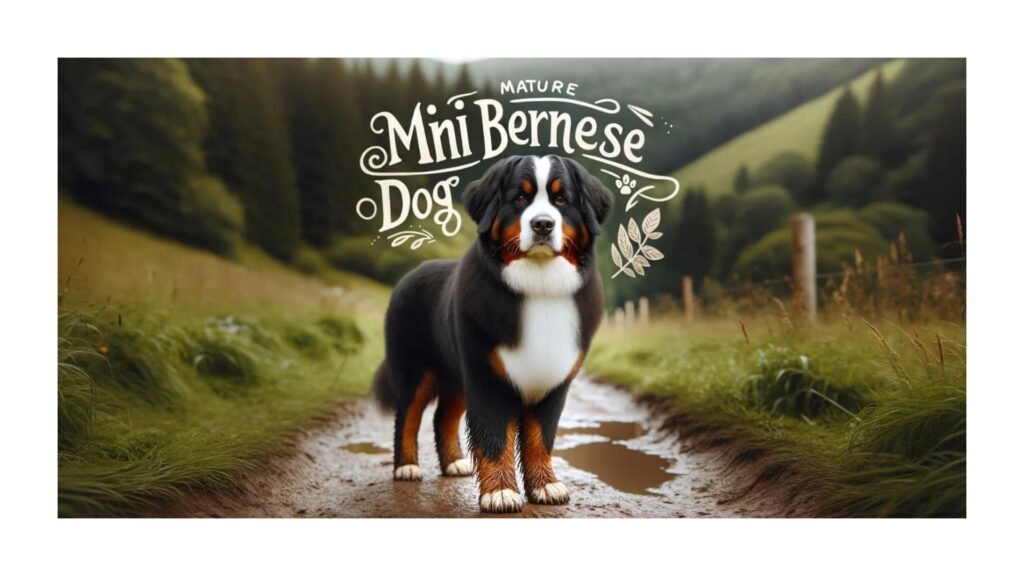The Bernese Mountain Dog, affectionately known as the “Berner,” is a large, powerful, and beautiful breed that has been capturing hearts worldwide. With its iconic tri-colored coat, gentle personality, and dedication to family, this breed is well-loved among dog enthusiasts and families alike. Originally bred in the Swiss Alps, the Bernese Mountain Dog is known for its versatility, loyalty, and gentle nature, making it an exceptional companion for families and individuals alike.
This guide covers everything you need to know about the Bernese Mountain Dog, including its history, appearance, personality traits, training, health considerations, and why it may be the perfect addition to your family.
History and Origins of the Bernese Mountain Dog
The Bernese Mountain Dogs traces its roots to the snowy slopes of the Swiss Alps, where it was initially bred as a working dog for farmers. Known as one of the four breeds classified as “Sennenhund” (Swiss Mountain Dogs), Bernese Mountain were bred specifically to help with farm duties such as pulling carts, herding cattle, and protecting the homestead. The breed gets its name from the Swiss canton of Bern, where it was most commonly found.
The breed’s origins date back to Roman times, believed to have been influenced by mastiff-type dogs brought by Roman soldiers. Over the centuries, these dogs adapted to the rugged conditions of the Alps, developing the resilience and strength that make them exceptional working dogs today.
Physical Characteristics and Appearance
Bernese Mountain are known for their striking appearance, often standing out with their thick, tri-colored coats and expressive faces.
- Size and Build
- Bernese Mountain are large, sturdy dogs with a solid, muscular build. Males typically stand between 25 to 27.5 inches at the shoulder, while females are slightly smaller at 23 to 26 inches. Their weight can range from 70 to 115 pounds, depending on factors like genetics and diet.
- Coat and Color
- The Berner’s coat is long, thick, and typically tri-colored, showcasing black, white, and rust markings. The breed’s coat not only gives it a majestic appearance but also serves to protect it from cold weather.
- Distinctive Features
- A Bernese Mountain face is often marked by a white blaze and expressive brown eyes that exude warmth and intelligence. Their floppy ears and wide, happy grin make them particularly endearing.
Personality and Temperament
One of the most beloved aspects of the Bernese Mountain Dog is its gentle, affectionate personality. Known for its loyal and protective nature, the Berner is an ideal family dog and forms strong bonds with its family members.
- Affectionate and Loyal
- Berners are famously loyal and have a deeply affectionate nature. They thrive in environments where they can be close to their families and enjoy spending time with both adults and children.
- Gentle and Patient
- Despite their size, Bernese Mountain Dogs are known for their gentle nature. They are patient and good with children, making them wonderful additions to family settings.
- Playful but Calm
- Berners have a playful side and enjoy outdoor activities, especially in cooler weather. However, they also have a calm temperament, allowing them to relax indoors without being overly energetic.
- Protective but Friendly
- Bernese Mountain Dogs are naturally protective and can be somewhat reserved with strangers. However, they are typically not aggressive and will warm up to guests after proper introductions.
Training a Bernese Mountain Dog
Training is essential for Bernese Mountain Dogs, as their large size can become overwhelming if they are not well-mannered. Here are some tips for training this breed effectively:
- Early Socialization
- Start socializing your Bernese Mountain Dog from a young age. Introducing them to various people, animals, and environments helps ensure they grow into well-rounded, confident adult dogs.
- Positive Reinforcement
- Berners respond best to positive reinforcement methods such as treats, praise, and play. Harsh corrections can lead to stress and anxiety in this sensitive breed.
- Obedience Training
- Focus on basic obedience training early on, including commands like sit, stay, come, and heel. Their intelligence and eagerness to please make them relatively easy to train, though they may be stubborn at times.
- Exercise Requirements
- While Bernese Mountain Dogs are not as energetic as some other large breeds, they still need regular exercise. A daily walk and playtime in the yard are usually sufficient, though they enjoy activities like hiking and agility training.
Health Considerations for Bernese Mountain Dogs
The Bernese Mountain Dog, unfortunately, has a shorter lifespan compared to some other breeds, often living between 6 and 8 years. Being aware of the common health concerns for Bernese Mountain Dogs can help extend their life and improve their quality of life.
- Hip and Elbow Dysplasia
- Like many large breeds, Berners are susceptible to hip and elbow dysplasia, conditions that can lead to pain and mobility issues. Regular vet check-ups, a balanced diet, and proper exercise can help manage this risk.
- Bloat
- Bloat, or gastric torsion, is a life-threatening condition that affects large, deep-chested breeds like the Berner. Feeding smaller, more frequent meals and avoiding exercise right after eating can help prevent this condition.
- Cancer
- Bernese Mountain Dogs have a higher-than-average risk of developing cancer, particularly mast cell tumors, lymphoma, and histiocytic sarcoma. Regular check-ups and prompt attention to any lumps or unusual symptoms are important.
- Joint Health
- Given their size, Bernese Mountain Dogs are prone to joint issues as they age. Maintaining a healthy weight, providing joint supplements, and engaging in low-impact activities can help support their joint health.

Grooming and Maintenance
- Coat Care
- Bernese Mountain Dogs shed year-round, with heavier shedding in spring and fall. Brushing their coat two to three times a week will help manage shedding and keep their coat shiny and healthy.
- Bathing and Nail Trimming
- Regular baths every 6-8 weeks help maintain their coat’s cleanliness, while nail trimming should be done every 3-4 weeks to prevent discomfort.
- Ear and Dental Care
- Regular ear cleaning is crucial to avoid ear infections, and weekly brushing will help keep their teeth healthy.
Is a Bernese Mountain Dog Right for You?
Bernese Mountain Dogs make fantastic pets for the right families, especially those who appreciate a dog with a gentle spirit and a strong work ethic. They thrive in homes where they have ample space to roam and play, and they do best with families who are committed to their exercise and grooming needs. Berners can adapt to various living environments but generally fare best in cooler climates due to their thick coats.
While they do require a good amount of attention and care, the rewards are immense. Bernese Mountain Dogs bring joy, loyalty, and love to their families, making the time and effort more than worth it.
Final Thoughts
The Bernese Mountain Dog is a wonderful breed for those looking for a loyal, loving, and versatile companion. With their warm personalities, strong work ethic, and gentle nature, Berners truly embodies the term “gentle giant.” Whether you’re looking for a family pet, a hiking buddy, or a dog with a calm temperament, the Bernese Mountain Dog might just be the perfect match. Remember, owning a Berner is a long-term commitment, so take the time to consider whether you can meet its needs for exercise, grooming, and companionship.
If you’re ready to welcome a Bernese Mountain Dog into your life, prepare for a journey filled with love, loyalty, and companionship that only a Berner can provide.
FAQs: Bernese Mountain Dog
1. Are Bernese Mountain Dogs good with children?
Yes, Bernese Mountain Dogs are known for their gentle, patient nature and typically do very well with children. Their calm temperament and protective instincts make them wonderful family dogs, especially in households with young kids. Supervision is recommended with younger children, as these large dogs might accidentally knock them over.
2. How much exercise does a Bernese Mountain Dog need?
Bernese Mountain require moderate daily exercise, including walks and playtime. They enjoy outdoor activities, especially in cooler weather, and benefit from activities like hiking and cart-pulling. Typically, 30-60 minutes of exercise per day is sufficient to keep them healthy and happy.
3. Do Bernese Mountain Dogs shed a lot?
Yes, Bernese Mountain shed year-round and go through heavier shedding periods in the spring and fall. Regular brushing two to three times per week can help manage shedding and keep their coat looking healthy.
4. How long do Bernese Mountain Dogs live?
Yes, Bernese Mountain are known for their gentle, patient nature and typically do very well with children. Their calm temperament and protective instincts make them wonderful family dogs, especially in households with young kids. Supervision is recommended with younger children, as these large dogs might accidentally knock them over.
5. Are Bernese Mountain Dogs easy to train?
Yes, Bernese Mountain are generally intelligent and eager to please, which makes them fairly easy to train. They respond well to positive reinforcement techniques. However, they can sometimes have a stubborn streak, so patience and consistency are key.
6. Do Bernese Mountain Dogs get along with other pets?
Bernese Mountain are usually friendly and sociable with other pets, especially when they’re properly socialized from a young age. They generally get along well with other dogs and can coexist peacefully with cats if introduced appropriately.
7. What are the common health problems in Bernese Mountain Dogs?
Bernese Mountain are prone to certain health issues, including hip and elbow dysplasia, bloat, and various types of cancer, such as lymphoma and histiocytic sarcoma. Regular vet check-ups and maintaining a healthy diet and weight can help manage or prevent some of these issues.
8. Are Bernese Mountain Dogs good for apartment living?
Due to their large size and need for space, Bernese Mountain Dogs are better suited to homes with yards or open spaces where they can move around. However, they can adapt to apartment living if they receive adequate daily exercise and outdoor time.
9. What kind of climate is best for Bernese Mountain Dogs?
Bernese Mountain Dogs have a thick, double coat that helps them handle cold weather exceptionally well. They thrive in cooler climates and may struggle in hot or humid environments. During warm weather, it’s essential to keep them cool and limit outdoor activities to early morning or late evening.
10. How much do Bernese Mountain Dogs eat?
The average adult Bernese Mountain Dog requires around 3-4 cups of high-quality dog food per day, split into two meals. However, this can vary depending on the dog’s age, weight, activity level, and overall health. Always consult your veterinarian to determine the appropriate diet for your specific dog.
